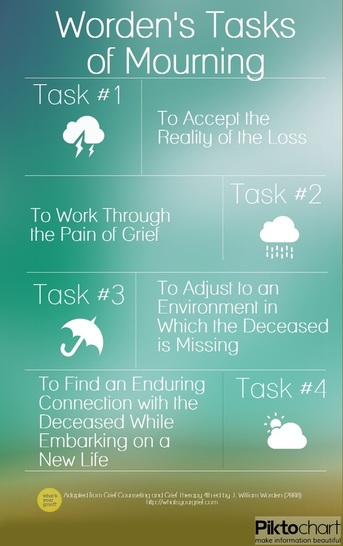 Many people are feeling strong emotions this week after a contentious presidential election. Some are joyful and others feel distraught. If you fall into the latter category, this post is for you. It may seem strange to talk about grief outside the context of death. Yet loss comes in many forms. Some people in the U.S., especially those who have been historically marginalized, are feeling the loss of a sense of safety, normalcy, or hope. Whatever you or others may think about the validity of these responses, it is important to have tools to help you move through feelings of loss if you are experiencing them. Although Elisabeth Kübler-Ross' work was important to an early understanding grief and loss, we have moved away from the traditional Five Stages of Grief model. When I worked as a volunteer counselor at hospice we were encouraged to help our clients move through William Worden’s Four Tasks of Mourning. The tasks can occur in any order. They are: Task #1: To Accept the Reality of the Loss You may have thought the world was one way when you went to bed on Election Night and then woke up to find it quite different than you expected. Shock and denial are normal responses when the unexpected or unthinkable occurs. You may want to hold off on facing reality for a while. Eventually you will understand and accept the situation. For now, take care of yourself. Practical suggestions: If others try to push you to talk about things you’re uncomfortable with, kindly and firmly let them know you’re not there yet. My friend Jennifer McCabe of Pluck With Purpose uses this phrase: “That’s a no for me.” Another option is to say: “I’m not available for that right now.” Listen to yourself and take baby steps toward acceptance if you're not there yet. You'll get there. Task #2: To Work Through the Pain of Grief When your emotions come, they may be stronger or different than you expected. It’s important to allow and accept them. Name your emotions: anger, fear, rage, defeat, disgust, sorrow, empathy, compassion, resignation. Remember, feelings are inherently neutral. Healthy emotions are meant to be felt and then released, not necessarily acted upon in the moment. Practical suggestions: Get a journal and write down all the things you are feeling, no matter how wild or inappropriate you think they are (burn the pages afterward — safely — if you like; this can feel cathartic too). Talk with a friend you trust and let them know you want to express yourself without judgment. Cry, scream, paint, dance, or sing your emotions. You may feel silly, and that's OK. Task #3: To Adjust to an Environment in Which the Deceased is Missing This task is about returning to your day-to-day life. Although your sense of self may feel shaken, you are still here. And your values are probably still intact. You may need to adjust your internal, external, or spiritual worlds going forward. Perhaps situations that worked before don’t seem to fit anymore. This election might have sparked a new or buried sense of purpose for you. Loss can transform you and stimulate growth. Practical suggestions: Take an inventory of your values. Write them down, then rank them according to importance. Connect with others to get support. Examine your home, your job, and your relationships and see if there are any adjustments that need to be made. (A word of caution: It isn’t advised to make rash decisions when you feel overly emotional. Put major life choices on hold until you complete Task #2.) Task #4: To Find an Enduring Connection With the Deceased While Embarking on a New Life Don’t forget what you have lost, while also moving forward with a sense of hope. Remember what is important to you. It will feel tempting to think you can’t do anything in the face of major change. You can. We still need diverse voices in the world from all sides. Practical suggestions: Consider volunteering for or donating to organizations you care about. Speak up for individuals or groups of people who are vulnerable. Reach out to communities in need and offer your skills and knowledge. Wherever you land on these tasks, honor where you are and accept it. You feel this way today. Tomorrow may be different. Others may criticize you or try to shame you for having an emotional response to the election. They are allowed their opinion. You can decide in the moment whether you want to engage or move along. Take care of yourself. Have courage, ask for help when you need it, and be well. Note: It's important to know that grief and depression can look similar. Grief usually comes in waves. You may feel OK one moment and then unexpectedly not OK the next. This is a typical response to grief. However, if you find yourself waking up every day feeling hopeless and despondent, it may be time to reach out for help from a professional. If you are in crisis, please call 911, or (for San Diego residents) the San Diego Access and Crisis Line: 888-724-7240 Comments are closed.
|
AuthorRachel Moore, LMFT, is a Licensed Marriage & Family Therapy in San Diego, CA. Rachel helps writers, artists, musicians, and other creative types overcome anxiety and trauma. She is certified in EMDR therapy and also trained in Brainspotting. Archives
December 2023
Categories
All
|
Rachel Moore, LMFT
Licensed Marriage & Family Therapist MFT #102826
rachel(at)rachelmoorecounseling.com
www.rachelmoorecounseling.com
619-577-4514
Licensed Marriage & Family Therapist MFT #102826
rachel(at)rachelmoorecounseling.com
www.rachelmoorecounseling.com
619-577-4514
Address:
3232 4th Avenue
San Diego, CA 92103
3232 4th Avenue
San Diego, CA 92103
(Remote video sessions also available for residents of California or Montana)
We are committed to providing a safe, affirming, and inclusive therapeutic space for all ages, races, gender identities, sexual orientations, national origins, relationship statuses, health statuses, disabilities, ethnicities, and religions.
If you are in crisis, assistance is available 24/7 at:
San Diego Access & Crisis Line
888-724-7240
National Suicide Prevention Line
Call or text: 988
If you are in crisis, assistance is available 24/7 at:
San Diego Access & Crisis Line
888-724-7240
National Suicide Prevention Line
Call or text: 988

 RSS Feed
RSS Feed

